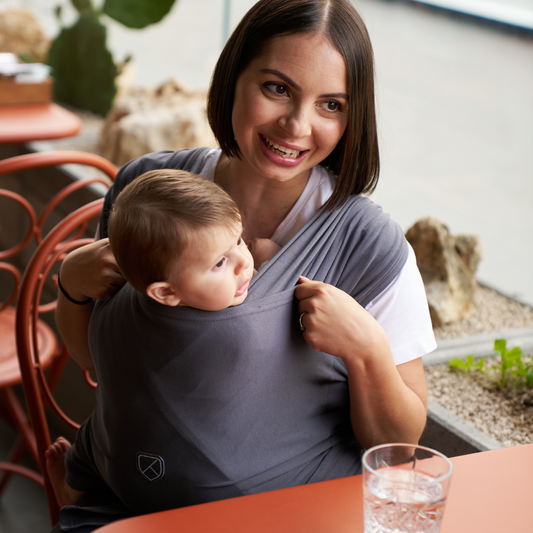When a baby brother or sister arrives, mums and dads worry about how their first born, who has been the centre of their attention up until now, will react.
It’s a significant change to a child's life, but just like all those other major transitions he or she will go through as they grow (such as starting nursery, nappy training...), it’s a completely normal physiological milestone in a child’s life.
Therefore, keep calm mums and dads and rest assured that after a few weeks things will get better! It is, however, much easier if you’re well-prepared and know how to deal with this milestone: how to tell your kids you are pregnant with their little brother or sister, when to tell your kids you're pregnant, and how to reassure them that your love towards them remains unchanged and will not diminish because there’s another baby in the family.
When to tell your child you're pregnant?
When to announce pregnancy to your children depends essentially on their age.
If your child is still a toddler (around two years old), they’ll struggle to make sense of something they cannot see. In addition, they still aren’t able to perceive the passage of time: for children of this age the future doesn’t exist, only the present.
With such young children, it’s better to wait until your belly starts to grow instead of sharing the good news early on. This will help them understand what is happening as they will be able to see it with their own eyes.
When to reveal pregnancy if your child is older, 6 or 7 years old? For older children, you can tell them about your pregnancy earlier, explaining clearly and simply what’s happening and what’ll happen in the coming months.
The most important thing is that you, as parents, are the first ones to tell your other children that a little baby brother or sister is on the way - if they find out from grandparents or friends at school, they’ll feel confused and betrayed.
How to reveal pregnancy to your child?
As we were saying, the first things to keep in mind when sharing your news are to ensure you choose your timing (not too early on in the pregnancy, especially if your child is only young) and also to ensure you are the first to tell them a new baby is on their way, to prevent them from hearing it form others beforehand, for example from their grandparents.
How to reveal pregnancy? What words to use? Here are 3 ideas on how to announce pregnancy to your child:
1) Explain clearly and truthfully what’s going to happen
Explain in simple, clear terms, adapted to your child’s age, what is going to happen in the coming months, both during the pregnancy and when the baby is born.
What changes are going to occur, how your family’s daily life will differ, what having a newborn baby in the house will be like and how the older sibling will be able to engage with them.
Focus on those changes related to everyday life, such as the fact that mum won’t be able to take them to school in the morning, and dad or granddad will do it instead, explaining that this will happen for a period of time as their little new brother/sister will be tiny and will need mum's constant care, just the same as when they were a newborn baby themselves.
2) Always tell the truth
A common mistake is when parents only talk about all the positive aspects of having a little baby brother/sister thinking it will make it easier for their older child to accept it and be excited about it. We all know very well the reality and challenges a newborn baby can bring!
For example, we often tell our children that they’ll be able to play with their new little brother or sister, however, in reality, they’ll have to wait a few months, and this may be difficult for them to comprehend and cause frustration.
It's better to tell them the truth that their little baby brother won't do anything else but eat, sleep and cry during the first few months, and they'll have to wait until he gets a little bit older until they can play with him.
Show your child pictures of when they were inside your belly and when they were a newborn, as this will make it easier to understand, and they will begin to realise that it was the same for them too, even if they don’t remember it.
Answer all your child’s questions honestly, and you may even find they ask you things that you didn't expect (that’s the great thing about children, they always surprise us with their view of the world which is so different from ours).
3) Listen to your child’s worries and offer reassurance
We generally expect children to show strong emotion about the arrival of a baby brother or sister (just as we may have done ourselves), but this may not happen right away. Don't be alarmed if your child doesn’t show particular interest or enthusiasm, it’s actually quite normal for their reaction to be neutral, especially if still young. The arrival of a little brother or sister is an abstract notion to a young child!
Always listen to their concerns without playing down their fears! Their worries are only natural, and they need reassurance and understanding.
It’s important to make your child understand that your love for them won’t decrease in any way, and to explain this you could borrow the words of Professor Fabio Celi (Head Psychologist of the USL of the Region of Tuscany and lecturer in developmental psychopathology):
‘mummy and daddy’s love are not like a cake, if, instead of having a cake all to oneself, we have to share it with someone else, we’ll eat less cake. Mummy and daddy’s love is like the warmth of the sun. It does not divide to be shared. The sun heats one child, ten children and a hundred children at the same time in the same way. If you’re on the beach playing, you don't have to share the warmth of the sun with your friends who are playing with you. You take all the warmth in. The others also take in all the warmth and perhaps the saying “the more, the merrier” is true'.
4 Books about becoming a big brother or sister
These story books for big sisters and books about being a big brother can help prepare your child for their new sibling. Here’s a few we recommend:
You're The Biggest

0-6 years
Featuring beautiful full-colour illustrations, this story follows two endearing foxes on an enchanting adventure, exploring the unique role of an older sibling. Encouraging participation and inclusion, the book gently guides children through the many special reasons why being a big brother or sister is so special.
Waiting for Baby
0-5 years
This book is centred around the anticipation of waiting for the new baby to arrive. The pictures in this book are colourful and the text offers questions that promote conversation, which allow the emotions of having a new baby to be explored.
There’s a House Inside My Mummy
0-4 years
This little board book tells it how it is through the eyes of a toddler. Beautifully written in simple rhyme, making it a wonderful, uncomplicated way of explaining things for a younger child.
I’m a Big Sister / I’m a Big Brother
0-5 years
Perfect stories for introducing little ones to what it will be like to have a new baby in the family. Both of these simple books gently prepare young ones for the big transition ahead.
The birth: how to prepare child for new baby?
Once you are 36-37 weeks pregnant and near your due date, start telling your child that mummy will be going to hospital for a few days to give birth to his little baby brother or sister. Clearly explain to your child who they’ll be with and what they’ll be doing when you’re in hospital.
That way they won’t be surprised by your sudden absence, and it’ll be less traumatic for them.
How to help child adjust to new baby after the birth
You as parents have had 9 months to prepare for the new arrival to your family, to process your fears, your worries... but your child will only experience the change now that the baby is born, and this is when all their feelings and emotions will surface.
This happens as children live entirely in the present, not in the past or future like us adults.
A mix of emotions: fear, annoyance, joy, jealousy, demand for attention... will all come out now and these feelings need to be met with validation and reassurance. The most important thing for your child at this time is that they don’t feel any change in the emotional presence of their parents.
This is precisely when more patience and understanding are needed if you feel your child regresses slightly in any area. They are only testing the new family dynamic they find themselves in, once they realise that you love them just as much as before, everything will be fine again.
Here's some guidance on how you should and shouldn’t behave towards your child during this time:
It’s good to..
- Allow your child to touch, caress and kiss your new baby, obviously helping them understand that they have to be gentle.
- Cuddle and give your older child more attention.
- Engage them in looking after their little brother or sister: undressing, changing their nappy, feeding them.... This will help your child feel useful and involved, which will, in turn, improve their behaviour.
- Validate their feelings without blaming or belittling them; help them to process and deal with their emotions.
- Don’t worry if you notice any slight regression during the first few weeks (for example, to their sleep, wanting to sleep in your bed, clinginess...) Embrace this moment of change with patience and everything will soon return to normal.
It’s best to avoid..
- Being over-protective of your new baby, showing excessive fear that your older child might unintentionally harm them. This would only accentuate any rivalry, while engaging your child in caring for your newborn will help make them feel important.
- Keeping the two siblings apart by sending your older child away to stay with a family member for the first few days.
- Phrases such as ‘you're a big boy now!’. Even if he’s the older one of the two, he’s still a child. A child should not be made to feel big just because there’s a new baby in the house.
- Other significant transitions during this period (if possible), such as taking away their dummy, nappy training, a new nursery, a house move, etc.
- Forcing your child to love their little brother or sister right from the start, their bond will develop gradually and naturally, especially when the baby is able to interact.
- Giving in to every demand. Rules and boundaries still need to be respected. Don’t fall into the trap of relaxing these rules just because you feel sorry for them, you have nothing to feel sorry about!
- Don’t fuss over your newborn excessively while in their presence, you may trigger rivalry and accentuate any jealousy they already feel.









